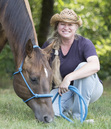Elena Hartwell's Blog, page 79
August 1, 2016
Thrillerfest Continued: Day Three, Debut Author Breakfast and Gillian Flynn
Day three of Thrillerfest was so jam packed with events it's going to require two different posts to cover it all.
 The day started early. The Jane Hotel is charming and cheap - and way down south in the West Village, so I had a trek to get up to the Grand Hyatt. I didn't want to be late, or be a hot sweaty mess in the NYC summer humidity, so I got a cab.
The day started early. The Jane Hotel is charming and cheap - and way down south in the West Village, so I had a trek to get up to the Grand Hyatt. I didn't want to be late, or be a hot sweaty mess in the NYC summer humidity, so I got a cab.
I love NYC cabs. Hailing one makes me feel like a grownup.
Debut Author Breakfast
Since it was Saturday, I zipped up and across town in record time, arriving well before our early morning event.
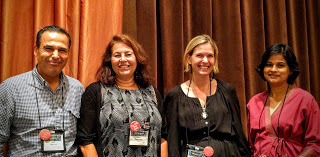 So many great new authors!
Click this link here for a complete list of the 2015/2016 Debut authors.
So many great new authors!
Click this link here for a complete list of the 2015/2016 Debut authors.
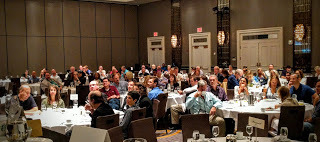
We started at 7:55. My fellow debut authors and I were curious about how many people would come out to support a bunch of lesser known writers first thing in the morning - especially after the cocktail party the night before - but the room was packed.
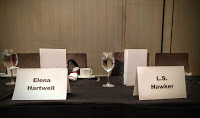
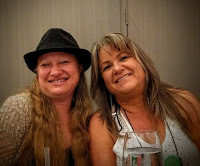
Sitting up on our dais felt like being a part of the biggest bridal party reception ever.
After introductions by Steve Berry, we all got to pitch our books to the room. It was a blur, but my fellow debuts told me I was coherent, so there's that to be thankful for.
After finishing our breakfast event, I went to Drugs, Bombs or Weapon Detection: K-9 Dogs in Thriller Novels. Cat Warren is one of my favorite speakers, so I was excited to hear what she had to say. And there's nothing better than seeing an active duty K-9. I had the chance to speak to Special Agent Ryan J Christie and meet his dog before the event, but he asked that we not post photos of them. I will just report that the dog and his handler were both adorable.
Next up Two Ladies Having An Adult Conversation: Spotlight Guest Gillian Flynn Interviewed by Karin Slaughter.
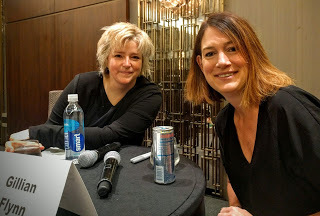
"We root for bad men and hope bad women get murdered." —Karin Slaughter
Fantastic interview. Who knew these two ladies were so funny! They've been friends for several years, so it felt like we were listening in on a gossip session over cocktails. They were also very gracious about posing for a picture. Here are some highlights from this marvelous event.
Gillian Flynn, world renowned for her book Gone Girl , appears publicly on a regular basis. In addition to seeing her at Thrillerfest, I'd seen her in person at a sold out Town Hall meeting in Seattle. It turns out she was cripplingly shy as a child. She's still "situationally shy" as an adult. Some types of public appearances bring that social anxiety back for her. I get this. I'm very outgoing, and most people think I never suffer social anxiety, but certain kinds of events are difficult for me too.
I'm also pleased to know that Gillian is not an outliner, she starts with a character or an image. I write this way, so that's two things I have in common with her. I love that!
Karin asked Gillian what it was like to have to follow Gone Girl with another book. She said she had to consciously think about how she wanted to write a great book - but not rewrite Gone Girl. "Never try to replicate that," she said about her breakout novel. She feels her biggest mistake would be to try to write that book again. She said she "didn't want to write a book because it's what (she) was supposed to write" to follow her wildly successful third novel.
Discussing her influences, Gillian mentioned her dad taught film and she was exposed to a variety of grownup movies very young in life. This included Alien, Psycho, and Bonnie and Clyde, viewed at the age of seven. Add in a mother who taught reading and Gillian's desire to write and success at writing dark stories, makes a lot of sense.
One of Gillian's favorite books as a child was The Westing Game by Ellen Raskin, which made her want to write mysteries. I wasn't familiar with this book, so now it's on my list of books to read.
Gillian spent ten years writing for Entertainment Weekly Magazine. When asked about her writing process, she said "I was covering the Lord of The Rings, then I'd come back to the hotel and kill a child, then write - so that's part of my process." (Laughs).
One of the things that struck me both times I've seen Gillian speak, is how down-to-earth and funny she is. Warm, thoughtful, and charming, it's fascinating to think about the dark places her mind can go. But we're all very glad it does.
Check back for Part II of Day Three
SaveSave
 The day started early. The Jane Hotel is charming and cheap - and way down south in the West Village, so I had a trek to get up to the Grand Hyatt. I didn't want to be late, or be a hot sweaty mess in the NYC summer humidity, so I got a cab.
The day started early. The Jane Hotel is charming and cheap - and way down south in the West Village, so I had a trek to get up to the Grand Hyatt. I didn't want to be late, or be a hot sweaty mess in the NYC summer humidity, so I got a cab.I love NYC cabs. Hailing one makes me feel like a grownup.
Debut Author Breakfast
Since it was Saturday, I zipped up and across town in record time, arriving well before our early morning event.
 So many great new authors!
Click this link here for a complete list of the 2015/2016 Debut authors.
So many great new authors!
Click this link here for a complete list of the 2015/2016 Debut authors.

We started at 7:55. My fellow debut authors and I were curious about how many people would come out to support a bunch of lesser known writers first thing in the morning - especially after the cocktail party the night before - but the room was packed.


Sitting up on our dais felt like being a part of the biggest bridal party reception ever.
After introductions by Steve Berry, we all got to pitch our books to the room. It was a blur, but my fellow debuts told me I was coherent, so there's that to be thankful for.
After finishing our breakfast event, I went to Drugs, Bombs or Weapon Detection: K-9 Dogs in Thriller Novels. Cat Warren is one of my favorite speakers, so I was excited to hear what she had to say. And there's nothing better than seeing an active duty K-9. I had the chance to speak to Special Agent Ryan J Christie and meet his dog before the event, but he asked that we not post photos of them. I will just report that the dog and his handler were both adorable.
Next up Two Ladies Having An Adult Conversation: Spotlight Guest Gillian Flynn Interviewed by Karin Slaughter.

"We root for bad men and hope bad women get murdered." —Karin Slaughter
Fantastic interview. Who knew these two ladies were so funny! They've been friends for several years, so it felt like we were listening in on a gossip session over cocktails. They were also very gracious about posing for a picture. Here are some highlights from this marvelous event.
Gillian Flynn, world renowned for her book Gone Girl , appears publicly on a regular basis. In addition to seeing her at Thrillerfest, I'd seen her in person at a sold out Town Hall meeting in Seattle. It turns out she was cripplingly shy as a child. She's still "situationally shy" as an adult. Some types of public appearances bring that social anxiety back for her. I get this. I'm very outgoing, and most people think I never suffer social anxiety, but certain kinds of events are difficult for me too.
I'm also pleased to know that Gillian is not an outliner, she starts with a character or an image. I write this way, so that's two things I have in common with her. I love that!
Karin asked Gillian what it was like to have to follow Gone Girl with another book. She said she had to consciously think about how she wanted to write a great book - but not rewrite Gone Girl. "Never try to replicate that," she said about her breakout novel. She feels her biggest mistake would be to try to write that book again. She said she "didn't want to write a book because it's what (she) was supposed to write" to follow her wildly successful third novel.
Discussing her influences, Gillian mentioned her dad taught film and she was exposed to a variety of grownup movies very young in life. This included Alien, Psycho, and Bonnie and Clyde, viewed at the age of seven. Add in a mother who taught reading and Gillian's desire to write and success at writing dark stories, makes a lot of sense.
One of Gillian's favorite books as a child was The Westing Game by Ellen Raskin, which made her want to write mysteries. I wasn't familiar with this book, so now it's on my list of books to read.
Gillian spent ten years writing for Entertainment Weekly Magazine. When asked about her writing process, she said "I was covering the Lord of The Rings, then I'd come back to the hotel and kill a child, then write - so that's part of my process." (Laughs).
One of the things that struck me both times I've seen Gillian speak, is how down-to-earth and funny she is. Warm, thoughtful, and charming, it's fascinating to think about the dark places her mind can go. But we're all very glad it does.
Check back for Part II of Day Three
SaveSave
Published on August 01, 2016 13:48
July 25, 2016
Historical Fiction Author Nancy Herriman - Part III
Summer has finally arrived in the Pacific Northwest.
La Niña
has heated up the rest of the country, but it's been relatively mild out here. After trips to New York City and Las Vegas, home for a few weeks of 75-80 degree weather feels great. So much to catch up on! Getting back to the gym, finishing book two of the Eddie Shoes Mystery Series, and my blog. So on that note, here's part III of my interview with author Nancy Herriman.
Scroll down for parts I and II.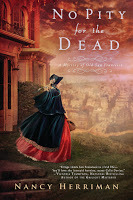
What do you love about singing with choral groups?There is an inexplicable joy in group performance done well. Making music recharges me and provides the ultimate escape. I don’t think of much else while I’m singing.
What are you working on now?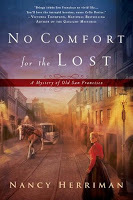 I’m working on a short story featuring the nurse sleuth from my mystery series, Celia Davies. Once I complete and polish that, it’s back to work on Book 3.
I’m working on a short story featuring the nurse sleuth from my mystery series, Celia Davies. Once I complete and polish that, it’s back to work on Book 3.
Final Words of Wisdom
To folks who’d like to write—Persevere. I’ve faced lots of obstacles in my writer’s journey, but the only way I’ve been able to reach any of my goals is to keep jumping over those hurdles.
Nancy Herriman abandoned a career in Engineering to chase around two small children and take up the pen. She hasn't looked back. A multi-published author, she is also a former winner of the Romance Writers of America's Daphne du Maurier award for Best Unpublished Mystery/ Romantic Suspense.
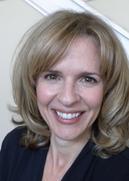
When not writing, she enjoys singing with various choral groups, gabbing about writing with friends, and eating dark chocolate. After two decades in Arizona, she now lives in her home state of Ohio with her family.
Scroll down for parts I and II.

What do you love about singing with choral groups?There is an inexplicable joy in group performance done well. Making music recharges me and provides the ultimate escape. I don’t think of much else while I’m singing.
What are you working on now?
 I’m working on a short story featuring the nurse sleuth from my mystery series, Celia Davies. Once I complete and polish that, it’s back to work on Book 3.
I’m working on a short story featuring the nurse sleuth from my mystery series, Celia Davies. Once I complete and polish that, it’s back to work on Book 3.Final Words of Wisdom
To folks who’d like to write—Persevere. I’ve faced lots of obstacles in my writer’s journey, but the only way I’ve been able to reach any of my goals is to keep jumping over those hurdles.
Nancy Herriman abandoned a career in Engineering to chase around two small children and take up the pen. She hasn't looked back. A multi-published author, she is also a former winner of the Romance Writers of America's Daphne du Maurier award for Best Unpublished Mystery/ Romantic Suspense.

When not writing, she enjoys singing with various choral groups, gabbing about writing with friends, and eating dark chocolate. After two decades in Arizona, she now lives in her home state of Ohio with her family.
Published on July 25, 2016 11:45
July 19, 2016
Historical Fiction Author Nancy Herriman - Part II of the interview!
 So nice to be back home after two weeks on the road. I enjoyed staying at The Orleans Hotel and Casino in Las Vegas, where the air-conditioning was as perfect as the hair on a werewolf drinkin' a pina colada at Trader Vic's.
So nice to be back home after two weeks on the road. I enjoyed staying at The Orleans Hotel and Casino in Las Vegas, where the air-conditioning was as perfect as the hair on a werewolf drinkin' a pina colada at Trader Vic's.The Public Safety Writers Association conference was terrific. So many experts in the room! I got to hang out with FBI Agents, Homicide Detectives, and other first responders. Lots of brains to pick for future books in the Eddie Shoes Mystery Series.
First order of business was to clean my desk.
 Yes... it really does get this bad....
Yes... it really does get this bad.... But now it looks like this!
But now it looks like this!Next order of business was to get the next set of interview questions with author Nancy Herriman up on my blog! Take it away Nancy.... (Scroll down for part I)
What is your research process?I start with upfront research as pertains to the fundamentals of the story—setting descriptions, background information on characters’ occupations, relevant historical events, things like that. A lot of my research occurs while I’m writing, though, when I have to look up specifics or want to add details. I can waste hours searching the internet for the brand name of an item one of my characters might use!
Your first career was as an Engineer, how did that training impact your writer's life?
When I first started, I imagined that I could attack writing in the same manner I’d solved problems at work—with a checklist and a set of formulas. It took me a while to learn that writing a novel is not quite so straightforward, and that there is no single magic recipe or set of rules. Although I do still like to use spreadsheets to help plot out my books. Once an engineer, always an engineer.
Excerpt from No Comfort for the Lost... Click on this link or the book cover to read further...
San Francisco, March 1867
The Chinese believed that some days were inauspicious, the ill tidings written in the passage of the heavenly bodies. Celia Davies gazed down at her patient, a delicate Chinese girl whose skin sported more bruises than unblemished flesh, and wondered if today would prove to be one of those days.
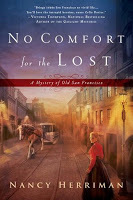
Check back soon for the end of the interview!
Nancy Herriman abandoned a career in Engineering to chase around two small children and take up the pen. She hasn't looked back. A multi-published author, she is also a former winner of the Romance Writers of America's Daphne du Maurier award for Best Unpublished Mystery/ Romantic Suspense.

When not writing, she enjoys singing with various choral groups, gabbing about writing with friends, and eating dark chocolate. After two decades in Arizona, she now lives in her home state of Ohio with her family.
Published on July 19, 2016 11:35
July 15, 2016
Thrillerfest Coverage Will Return Soon - But First, an Interview with Author Nancy Herriman
It's a very busy time here at arcofawriter.com. Last week was Thrillerfest - a weekend so chock full of literary excellence I'm not yet finished with my coverage. This weekend I'm in Las Vegas for the Public Safety Writers Association Conference. Updates about that experience to come as well. But first, I want to turn the blog over to my regularly scheduled guest, author Nancy Herriman.
Nancy Herriman abandoned a career in Engineering to chase around two small children and take up the pen. She hasn't looked back. A multi-published author, she is also a former winner of the Romance Writers of America's Daphne du Maurier award for Best Unpublished Mystery/ Romantic Suspense.

When not writing, she enjoys singing with various choral groups, gabbing about writing with friends, and eating dark chocolate. After two decades in Arizona, she now lives in her home state of Ohio with her family.
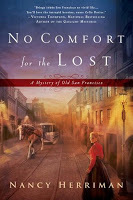
You write historical fiction, what draws you to that genre?
I’ve always been fascinated by history. Most specifically, social history, which studies the experiences of everyday folks in the past. Since I was young I’ve tried to imagine what it was like to live in a small village in medieval England or to walk the streets of ancient Rome or a nineteenth-century American city. I also truly believe that studying the past can teach you a great deal about life today. So, when I began to write, it only seemed natural to set my books in the places and times that have intrigued me for so long.
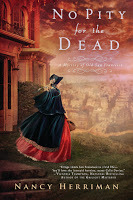 What made you decide to set your series in San Francisco? I love the city, and I wanted to take advantage of its rich lore. What an interesting town full of even more interesting and colorful characters! It’s no surprise, I think, that Mark Twain made his mark there. Plus, the mixture of people who’ve called the city home from its founding—Italians, Irish, Mexican, English, Chinese, Germans, etc, etc—makes for a fabulous blend as well as provides opportunities for strife, which is useful when you’re writing a mystery series. Furthermore, it doesn’t hurt that San Franciscans are passionate about their city’s history, and there are many, many resources available on the web, things like maps and newspapers and photos. Makes doing research so much simpler.
What made you decide to set your series in San Francisco? I love the city, and I wanted to take advantage of its rich lore. What an interesting town full of even more interesting and colorful characters! It’s no surprise, I think, that Mark Twain made his mark there. Plus, the mixture of people who’ve called the city home from its founding—Italians, Irish, Mexican, English, Chinese, Germans, etc, etc—makes for a fabulous blend as well as provides opportunities for strife, which is useful when you’re writing a mystery series. Furthermore, it doesn’t hurt that San Franciscans are passionate about their city’s history, and there are many, many resources available on the web, things like maps and newspapers and photos. Makes doing research so much simpler. Check back for the rest of the interview.
Published on July 15, 2016 15:02
July 12, 2016
Lee Child, CJ Box, and Reavis Wortham walk into Thrillerfest: Day 2
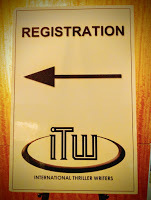 Day two at Thrillerfest 2016 starts off on a high note. I'd volunteered to work the registration desk for a few hours in the morning. My fellow volunteers are friendly and welcoming. It's fun to meet the other writers, including some of my fellow Debut Authors and bloggers I've been communicating with via emails and social media.
Day two at Thrillerfest 2016 starts off on a high note. I'd volunteered to work the registration desk for a few hours in the morning. My fellow volunteers are friendly and welcoming. It's fun to meet the other writers, including some of my fellow Debut Authors and bloggers I've been communicating with via emails and social media.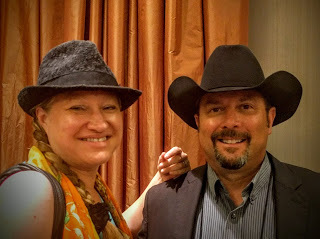 Next thing I know, I'm talking to CJ Box, winner of - among others - an Edgar, an Anthony, a Macavity, and a Barry award.
Next thing I know, I'm talking to CJ Box, winner of - among others - an Edgar, an Anthony, a Macavity, and a Barry award.CJ Box is the author of the Joe Pickett series - starting with Open Season - along with several stand alone novels. He has written twenty-one books, has been translated into almost thirty languages, and has sold more than ten million copies worldwide.
And I'm standing there wishing him a good time at the conference! Kind of a great way to start the day.
I attended CJ's Spotlight Guest interview after I finish up my volunteer time. He's a fabulous speaker. A native of Wyoming, he still lives in the sparsely populated state and sets many of his books there. Joe Pickett is a game warden in Twelve Sleep, WY, and CJ brings that vast, open, western state to life with his brisk dialogue and descriptive prose.
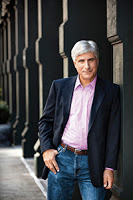 When three o'clock rolls around, I get to hang out with Steve Berry. Steve's books have been translated and sold in over fifty countries. He has sold so many copies of his books, I had to count the zeros twice... 20,000,000. Steve is also one of the founders for The International Thriller Writers, and he's giving back to his community by spending two hours with the 2016 Debut class to talk to us about the craft, the business, and the life of being a writer.
When three o'clock rolls around, I get to hang out with Steve Berry. Steve's books have been translated and sold in over fifty countries. He has sold so many copies of his books, I had to count the zeros twice... 20,000,000. Steve is also one of the founders for The International Thriller Writers, and he's giving back to his community by spending two hours with the 2016 Debut class to talk to us about the craft, the business, and the life of being a writer.I walk away better prepared, more confident, and very, very grateful.
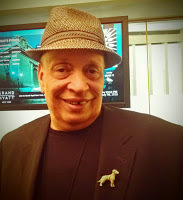 Then, because you just never know who might be wandering the halls, I run into Walter Mosley. Walter is the author of more than fifty novels, including the Easy Rawlins series, which burst on the literary scene in 1990 with Devil in a Blue Dress.
Then, because you just never know who might be wandering the halls, I run into Walter Mosley. Walter is the author of more than fifty novels, including the Easy Rawlins series, which burst on the literary scene in 1990 with Devil in a Blue Dress.But the thrills don't stop there. Waiting in the lobby before the Friday night cocktail party, hosted by Random house, I run into Reavis Wortham. I had the pleasure of being on a panel at Bouchercon last year with Reavis, and have been quietly cyberstalking him ever since. Okay, so not stalking exactly, but I do enjoy following him on social media. He's a terrific role model for a new author. He writes the Red River Mystery series, the first of which, Rock Hole, came out in 2011. He has since written five other novels and just moved over to Kensington Books. I look at him as a writer far enough ahead of me to be inspiring, but not so far ahead I can't follow his tracks on that red dirt road of this writing journey.
As we're chatting - me and Reavis and his lovely bride - another writer walks up to say hello. And I'm standing with Reavis and Lee Child.
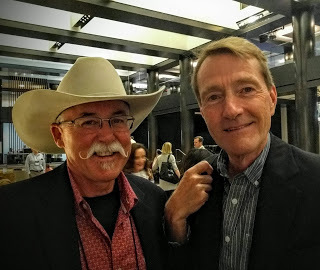
Yes, that Lee Child. Author of the Jack Reacher Series. Author of fifteen novels, which have sold more than 40 million copies in 75 countries around the world.
After I get my hands to stop shaking and my voice to drop back down an octave, I get up the nerve to ask a question.
Check back for my next post to get Lee Child's words of wisdom.
Thrillerfest... TO BE CONTINUED.....
SaveSave
Published on July 12, 2016 13:33
July 7, 2016
THRILLERFEST XI: Day One
 An interesting first day in New York for ThrillerFest 2016. Landed at Newark just before 8am, only to find a rather interesting scene. I'm still wondering what was going on with this plane...
An interesting first day in New York for ThrillerFest 2016. Landed at Newark just before 8am, only to find a rather interesting scene. I'm still wondering what was going on with this plane...
The Jane Hotel - my home away from home for the next couple of days - reminds me of being on a train in Europe ... narrow hallways and tiny cubicles, but the building doesn't clickity clack and I anticipate waking up in the same country I go to sleep in.

After settling in, visiting with a friend, having a nap (I can't do the red eye flights like I used to), I head out for the Grand Hyatt.
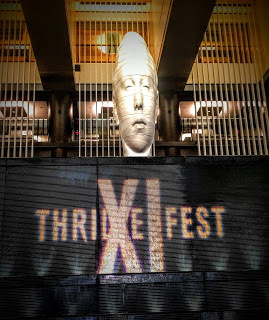 It's easy to know when I'm in the right place.
It's easy to know when I'm in the right place.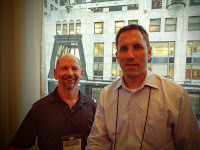 Hanging out with writers is always entertaining.
Hanging out with writers is always entertaining.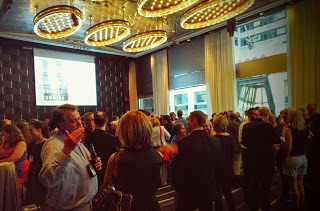 Especially a whole room of them. After a glass of wine and some good conversation, I head back out onto the streets.
Especially a whole room of them. After a glass of wine and some good conversation, I head back out onto the streets. Only to find 42nd blocked off ... and 41st ... and... Protests over the recent police shootings are taking place near Times Square. People and police cars block the streets. The air flashes red from emergency vehicles and a helicopter circles overhead.

My day has been bookended by hints of violence. The potential for something to explode. I'm not afraid, neither event made me fear for my own safety, but I'm fully conscious of a precariousness to calm. The air crackles with the possibility of something spilling over and spilling out.
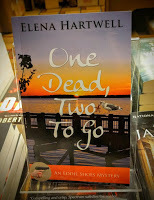 Mystery and thriller writers weave fictional stories around acts of violence. Though my novel is lighter than most - with humor and character relationships at the heart of things - I've had reminders lately of how fast things can become dangerous in the real world. I wonder what tomorrow will bring - I'm hoping it starts with a bagel ... and calm.SaveSave
Mystery and thriller writers weave fictional stories around acts of violence. Though my novel is lighter than most - with humor and character relationships at the heart of things - I've had reminders lately of how fast things can become dangerous in the real world. I wonder what tomorrow will bring - I'm hoping it starts with a bagel ... and calm.SaveSave
Published on July 07, 2016 19:53
July 5, 2016
Contest Winner - TWO DEAD ARE BETTER THAN ONE has a new character name!
I'm very pleased to announce the contest winner for my Name-the-character contest. Not only am I thrilled about the name - but I get to keep it in the family as winner Shelley Ferguson happens to be my beautiful niece. Shelley came up with a brilliant concept, which fits both the characters and the unfolding story of Eddie Shoes, thank you Shelley!
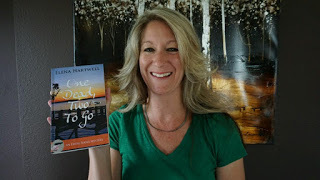
You'll have to wait for Two Dead Are Better Than One, launching April 15, 2017 to discover her winning entry. Meanwhile, don't miss One Dead, Two to Go available now through Amazon, Barnes and Noble, KOBO, Ibooks, and fine bookstores near you.
Thanks to all who participatedSuch wonderful, creative names!!

You'll have to wait for Two Dead Are Better Than One, launching April 15, 2017 to discover her winning entry. Meanwhile, don't miss One Dead, Two to Go available now through Amazon, Barnes and Noble, KOBO, Ibooks, and fine bookstores near you.
Thanks to all who participatedSuch wonderful, creative names!!
Published on July 05, 2016 16:55
June 26, 2016
Question Three with Thriller Writer Robert Rapoza
Here at Arcofawriter, pets are very important. I noticed author Robert Rapoza had a very cute dog, so I thought I'd ask about his little superhero.
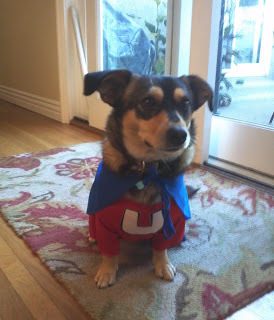 My dog's name is Bandit and he is a mutt. We purchased him from a rescue, taking the whole family, my wife, daughter and son, to make the decision. Once we got to the shelter, Bandit, a pup at the time wandered to my son and sat down in his lap. We wanted a hypoallergenic dog that didn't shed, as I have allergies to dog dander. We were assured that Bandit was part Poodle and, therefore, we wouldn't find fur falling off all around the house The decision was made and we made arrangements for a home visit. The owner came and declared us a fit family and we've had Bandit ever since. Let me say that the hypoallergenic claim was one of the greatest examples of false advertising of all time. I could make a coat with all the fur Bandit sheds each week. But he's a wonderful dog and we love him dearly.
My dog's name is Bandit and he is a mutt. We purchased him from a rescue, taking the whole family, my wife, daughter and son, to make the decision. Once we got to the shelter, Bandit, a pup at the time wandered to my son and sat down in his lap. We wanted a hypoallergenic dog that didn't shed, as I have allergies to dog dander. We were assured that Bandit was part Poodle and, therefore, we wouldn't find fur falling off all around the house The decision was made and we made arrangements for a home visit. The owner came and declared us a fit family and we've had Bandit ever since. Let me say that the hypoallergenic claim was one of the greatest examples of false advertising of all time. I could make a coat with all the fur Bandit sheds each week. But he's a wonderful dog and we love him dearly.
Scroll down to read the rest of the interview with Robert Rapoza, author of The Vilcabamba Prophecy.
 My dog's name is Bandit and he is a mutt. We purchased him from a rescue, taking the whole family, my wife, daughter and son, to make the decision. Once we got to the shelter, Bandit, a pup at the time wandered to my son and sat down in his lap. We wanted a hypoallergenic dog that didn't shed, as I have allergies to dog dander. We were assured that Bandit was part Poodle and, therefore, we wouldn't find fur falling off all around the house The decision was made and we made arrangements for a home visit. The owner came and declared us a fit family and we've had Bandit ever since. Let me say that the hypoallergenic claim was one of the greatest examples of false advertising of all time. I could make a coat with all the fur Bandit sheds each week. But he's a wonderful dog and we love him dearly.
My dog's name is Bandit and he is a mutt. We purchased him from a rescue, taking the whole family, my wife, daughter and son, to make the decision. Once we got to the shelter, Bandit, a pup at the time wandered to my son and sat down in his lap. We wanted a hypoallergenic dog that didn't shed, as I have allergies to dog dander. We were assured that Bandit was part Poodle and, therefore, we wouldn't find fur falling off all around the house The decision was made and we made arrangements for a home visit. The owner came and declared us a fit family and we've had Bandit ever since. Let me say that the hypoallergenic claim was one of the greatest examples of false advertising of all time. I could make a coat with all the fur Bandit sheds each week. But he's a wonderful dog and we love him dearly.Scroll down to read the rest of the interview with Robert Rapoza, author of The Vilcabamba Prophecy.
Published on June 26, 2016 10:17
June 10, 2016
Question Two with Robert Rapoza, Thriller Writer and fellow ITW Debut Author
Scroll Down For Question One
Describe your writing process:
 The first step in my writing process is to brainstorm for book ideas. I look for interesting articles online and/or by reading books on subjects that interest me. I try to find a new twist on an old subject or try something completely new. This is the first round of research I undertake with a new book and it will help to determine the main concept, location and characters for the novel.
The first step in my writing process is to brainstorm for book ideas. I look for interesting articles online and/or by reading books on subjects that interest me. I try to find a new twist on an old subject or try something completely new. This is the first round of research I undertake with a new book and it will help to determine the main concept, location and characters for the novel.
With my idea in place, I develop my protagonist and antagonist and several supporting characters. As they begin to take shape, I flesh these characters out and get to know them. I think about how they talk and act and sometimes write a brief description of each (name, physical characteristics, how they are related to each other, how they feel about things and what their character like and dislike.)
Next, I come up with the backstory for my novel. This is normally a few paragraphs to better help me understand what is taking place in the story and why. For example, for my first book, I wrote that an alien civilization watched the universe for signs of intelligent life developing and, once a new civilization reached a certain point of development, the aliens sent a scout team to study them. They came to Earth 3000 years ago to study humans and set up a base in the jungles of Peru where they came into contact with the local inhabitants and interbred. (I went into more detail about how the tribes split, and the countdown to reunification, but this gives you an idea).
 By now, the idea and storyline are beginning to take shape, so the next step is write out the main plot ideas and sequence of events. On my first pass through, the sequence of events might not be in the order they follow for the final version of the story, but it’s important to determine what will happen and where it will take place. I’m shooting for about 80,000 words for a novel, so I spend some time asking ‘what if’ questions, resulting in additional plot points. This will result in a bulleted list of plot points which will serve as the framework for each chapter. Once I complete this exercise, I go through each bullet point and put them in logical order so that the action flows in a logical sequence.
By now, the idea and storyline are beginning to take shape, so the next step is write out the main plot ideas and sequence of events. On my first pass through, the sequence of events might not be in the order they follow for the final version of the story, but it’s important to determine what will happen and where it will take place. I’m shooting for about 80,000 words for a novel, so I spend some time asking ‘what if’ questions, resulting in additional plot points. This will result in a bulleted list of plot points which will serve as the framework for each chapter. Once I complete this exercise, I go through each bullet point and put them in logical order so that the action flows in a logical sequence.
Now comes the actual writing. I try to start with a character in trouble to engage the reader right away. I don’t worry too much about editing as I write, I just want to get my thoughts down. As I writer, I consider how my character will react to the situation, based on the personality sketch I created earlier. I follow this process for each bullet point, adding and subtracting from the story as it begins to unfold.
As the chapters progress, I determine what additional research I need to conduct to make the story more believable. I want to make sure details are correct as this will help to keep the reader engrossed in the story. I make sure not to just data dump so it becomes necessary to determine what I need to cut since there is always more information than I can use in the story.
Once I finish my manuscript, I put it aside for a while. When I come back to it, it’s much easier for me to do my first round of editing. I like to print out my manuscript, especially for the first pass through it. The first round of editing, for me, is to find spelling and punctuation errors and to fix some basic sentence structure issues. I’ll also look for POV issues and holes in my story.
 Based on the changes I made, I’ll make my first rewrites cleaning up the issues I found. I will also print out my table of contents and find where the story needs development and will add or cut as needed. Once this process is complete, I begin my second round of editing. This is a finer process where I go through every sentence again trying to fine tune the wording. I also begin to cut things that don’t work and really follow the story carefully.
Based on the changes I made, I’ll make my first rewrites cleaning up the issues I found. I will also print out my table of contents and find where the story needs development and will add or cut as needed. Once this process is complete, I begin my second round of editing. This is a finer process where I go through every sentence again trying to fine tune the wording. I also begin to cut things that don’t work and really follow the story carefully.
Once complete, I will then send my manuscript out for professional editing to see what I have missed. I feel it’s critical to get an impartial, professional editor to go through my story with an impassioned eye for any details I’ve missed. The professional editor always has suggested changes and still catches grammatical errors. The editors I have used all use track changes which makes it easier to either accept or refuse the changes.
By the end of this process, I have a very clean copy to send out to Beta Readers to get their input. The neat part about this part of writing is to see their responses. Most Beta Readers catch different things (spelling/punctuation errors, plot problems, mis-behaving characters). I wait to hear back from all of my Beta Readers and then make changes accordingly. These can be minor or major changes (like the time in my second book when I switched two characters). After this step, my book is ready for the public to read.
Check back for Question Three!
Describe your writing process:
 The first step in my writing process is to brainstorm for book ideas. I look for interesting articles online and/or by reading books on subjects that interest me. I try to find a new twist on an old subject or try something completely new. This is the first round of research I undertake with a new book and it will help to determine the main concept, location and characters for the novel.
The first step in my writing process is to brainstorm for book ideas. I look for interesting articles online and/or by reading books on subjects that interest me. I try to find a new twist on an old subject or try something completely new. This is the first round of research I undertake with a new book and it will help to determine the main concept, location and characters for the novel.With my idea in place, I develop my protagonist and antagonist and several supporting characters. As they begin to take shape, I flesh these characters out and get to know them. I think about how they talk and act and sometimes write a brief description of each (name, physical characteristics, how they are related to each other, how they feel about things and what their character like and dislike.)
Next, I come up with the backstory for my novel. This is normally a few paragraphs to better help me understand what is taking place in the story and why. For example, for my first book, I wrote that an alien civilization watched the universe for signs of intelligent life developing and, once a new civilization reached a certain point of development, the aliens sent a scout team to study them. They came to Earth 3000 years ago to study humans and set up a base in the jungles of Peru where they came into contact with the local inhabitants and interbred. (I went into more detail about how the tribes split, and the countdown to reunification, but this gives you an idea).
 By now, the idea and storyline are beginning to take shape, so the next step is write out the main plot ideas and sequence of events. On my first pass through, the sequence of events might not be in the order they follow for the final version of the story, but it’s important to determine what will happen and where it will take place. I’m shooting for about 80,000 words for a novel, so I spend some time asking ‘what if’ questions, resulting in additional plot points. This will result in a bulleted list of plot points which will serve as the framework for each chapter. Once I complete this exercise, I go through each bullet point and put them in logical order so that the action flows in a logical sequence.
By now, the idea and storyline are beginning to take shape, so the next step is write out the main plot ideas and sequence of events. On my first pass through, the sequence of events might not be in the order they follow for the final version of the story, but it’s important to determine what will happen and where it will take place. I’m shooting for about 80,000 words for a novel, so I spend some time asking ‘what if’ questions, resulting in additional plot points. This will result in a bulleted list of plot points which will serve as the framework for each chapter. Once I complete this exercise, I go through each bullet point and put them in logical order so that the action flows in a logical sequence. Now comes the actual writing. I try to start with a character in trouble to engage the reader right away. I don’t worry too much about editing as I write, I just want to get my thoughts down. As I writer, I consider how my character will react to the situation, based on the personality sketch I created earlier. I follow this process for each bullet point, adding and subtracting from the story as it begins to unfold.
As the chapters progress, I determine what additional research I need to conduct to make the story more believable. I want to make sure details are correct as this will help to keep the reader engrossed in the story. I make sure not to just data dump so it becomes necessary to determine what I need to cut since there is always more information than I can use in the story.
Once I finish my manuscript, I put it aside for a while. When I come back to it, it’s much easier for me to do my first round of editing. I like to print out my manuscript, especially for the first pass through it. The first round of editing, for me, is to find spelling and punctuation errors and to fix some basic sentence structure issues. I’ll also look for POV issues and holes in my story.
 Based on the changes I made, I’ll make my first rewrites cleaning up the issues I found. I will also print out my table of contents and find where the story needs development and will add or cut as needed. Once this process is complete, I begin my second round of editing. This is a finer process where I go through every sentence again trying to fine tune the wording. I also begin to cut things that don’t work and really follow the story carefully.
Based on the changes I made, I’ll make my first rewrites cleaning up the issues I found. I will also print out my table of contents and find where the story needs development and will add or cut as needed. Once this process is complete, I begin my second round of editing. This is a finer process where I go through every sentence again trying to fine tune the wording. I also begin to cut things that don’t work and really follow the story carefully. Once complete, I will then send my manuscript out for professional editing to see what I have missed. I feel it’s critical to get an impartial, professional editor to go through my story with an impassioned eye for any details I’ve missed. The professional editor always has suggested changes and still catches grammatical errors. The editors I have used all use track changes which makes it easier to either accept or refuse the changes.
By the end of this process, I have a very clean copy to send out to Beta Readers to get their input. The neat part about this part of writing is to see their responses. Most Beta Readers catch different things (spelling/punctuation errors, plot problems, mis-behaving characters). I wait to hear back from all of my Beta Readers and then make changes accordingly. These can be minor or major changes (like the time in my second book when I switched two characters). After this step, my book is ready for the public to read.
Check back for Question Three!
Published on June 10, 2016 09:40
June 6, 2016
Three Questions for Thriller Writer Robert Rapoza: Question One
You have a longtime interest in history and archeology, did you do specific research for The Vilcabamba Prophecy? Have you visited the region you set the book in?
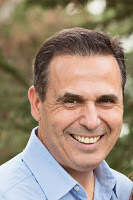 I conducted a great deal of research into the ruins of Peru and their background stories. One of the reasons I chose this country was due to the vast number of ancient civilizations that once called the region home. The Sacred Valley, an area in Peru, is dotted with many ruins and archeological wonders. As the home to the former Incan empire, the country is rich with lore about lost treasures and civilizations. Sadly, I haven’t had a chance to visit the region yet, but it’s high on my “Must See” list. Aside from research about Peru, I also had to research various other subjects including background on the British Special Air Service(SAS), as the mercenaries who work for the antagonist, Frances Dumond, are former members of this branch of the military. My research included the history of the SAS, along with training methods and weapons favored by its members. I also conducted research into large corporations to see what sorts of industries would form the secret cabal working behind the scenes. This helped me to flesh out some of the minor characters in the story.
I conducted a great deal of research into the ruins of Peru and their background stories. One of the reasons I chose this country was due to the vast number of ancient civilizations that once called the region home. The Sacred Valley, an area in Peru, is dotted with many ruins and archeological wonders. As the home to the former Incan empire, the country is rich with lore about lost treasures and civilizations. Sadly, I haven’t had a chance to visit the region yet, but it’s high on my “Must See” list. Aside from research about Peru, I also had to research various other subjects including background on the British Special Air Service(SAS), as the mercenaries who work for the antagonist, Frances Dumond, are former members of this branch of the military. My research included the history of the SAS, along with training methods and weapons favored by its members. I also conducted research into large corporations to see what sorts of industries would form the secret cabal working behind the scenes. This helped me to flesh out some of the minor characters in the story.
Next, I had to research volcanoes as El Misti, a volcano in Peru, played a major role in the story.

I searched for past eruptions of similar volcanos to get an idea of how the process plays out. In fact, I consider El Misti to be a character in some ways, as its behavior influences the cadence of the story. I conducted much more research, but this gives you an idea of the type of subjects I had to learn about to write my story.Check back for the next installment.
 I conducted a great deal of research into the ruins of Peru and their background stories. One of the reasons I chose this country was due to the vast number of ancient civilizations that once called the region home. The Sacred Valley, an area in Peru, is dotted with many ruins and archeological wonders. As the home to the former Incan empire, the country is rich with lore about lost treasures and civilizations. Sadly, I haven’t had a chance to visit the region yet, but it’s high on my “Must See” list. Aside from research about Peru, I also had to research various other subjects including background on the British Special Air Service(SAS), as the mercenaries who work for the antagonist, Frances Dumond, are former members of this branch of the military. My research included the history of the SAS, along with training methods and weapons favored by its members. I also conducted research into large corporations to see what sorts of industries would form the secret cabal working behind the scenes. This helped me to flesh out some of the minor characters in the story.
I conducted a great deal of research into the ruins of Peru and their background stories. One of the reasons I chose this country was due to the vast number of ancient civilizations that once called the region home. The Sacred Valley, an area in Peru, is dotted with many ruins and archeological wonders. As the home to the former Incan empire, the country is rich with lore about lost treasures and civilizations. Sadly, I haven’t had a chance to visit the region yet, but it’s high on my “Must See” list. Aside from research about Peru, I also had to research various other subjects including background on the British Special Air Service(SAS), as the mercenaries who work for the antagonist, Frances Dumond, are former members of this branch of the military. My research included the history of the SAS, along with training methods and weapons favored by its members. I also conducted research into large corporations to see what sorts of industries would form the secret cabal working behind the scenes. This helped me to flesh out some of the minor characters in the story. Next, I had to research volcanoes as El Misti, a volcano in Peru, played a major role in the story.

I searched for past eruptions of similar volcanos to get an idea of how the process plays out. In fact, I consider El Misti to be a character in some ways, as its behavior influences the cadence of the story. I conducted much more research, but this gives you an idea of the type of subjects I had to learn about to write my story.Check back for the next installment.
Published on June 06, 2016 09:23

